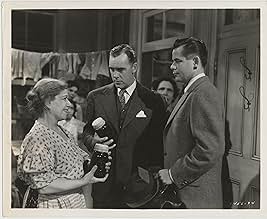Aggiungi una trama nella tua linguaDr. Michael Corday, a recent graduate of the Harvard Medical School, is the son of Dr. John Corday, an eminent New York City surgeon who has a tendency to continue to direct the lives of his... Leggi tuttoDr. Michael Corday, a recent graduate of the Harvard Medical School, is the son of Dr. John Corday, an eminent New York City surgeon who has a tendency to continue to direct the lives of his grown children. The daughter, Fabienne, runs away from home and Michael, after first foll... Leggi tuttoDr. Michael Corday, a recent graduate of the Harvard Medical School, is the son of Dr. John Corday, an eminent New York City surgeon who has a tendency to continue to direct the lives of his grown children. The daughter, Fabienne, runs away from home and Michael, after first following his father's advice of being callous to the point of cruelty toward patients, change... Leggi tutto
- Mariette
- (as Nancy Davis)
- Mother of Boy with Diphtheria
- (non citato nei titoli originali)
- Boy
- (non citato nei titoli originali)
- Patient
- (non citato nei titoli originali)
- Father
- (non citato nei titoli originali)
- Nurse
- (non citato nei titoli originali)
- Nurse
- (non citato nei titoli originali)
- Sexy Girl
- (non citato nei titoli originali)
Trama
Lo sapevi?
- QuizThis was Glenn Ford's first movie for MGM.
- BlooperWhen Michael is in the outpatient clinic, the chest x-ray on the view-box by his desk is reversed.
- Citazioni
Dr. Michael Corday: [after waking his superior in the middle of the night] Look, I know you don't like me. I don't blame you. But I had to talk to somebody, that's why I came here...
Dr. Alfred Norton: ...sit down. What's wrong?
Dr. Michael Corday: Thanks.
Dr. Alfred Norton: [seeing the grim look on Corday's face, and trying to break the tension] What, did you kill somebody?
Dr. Michael Corday: [laughs nervously] No.
Dr. Alfred Norton: That's alright. I've heard about the girl. What's the trouble?
Dr. Michael Corday: My father.
Dr. Alfred Norton: Oh, I see.
Dr. Michael Corday: You see, if I get involved with her, I'm on my own. If I toe the line, I can have the residency at Chelsea. It's... well, you know what that means.
Dr. Alfred Norton: Yeah. I'd like to help you out... but nobody can make that decision - you have to make it for yourself.
Dr. Michael Corday: [Dejectedly, as he gets up to leave] You're right, I shouldn't have come here. I'm sorry. I'll just...
Dr. Alfred Norton: [takes out a bottle of whiskey] . Sit down, sit down. I'm awake now. Let's have a drink together.
Dr. Michael Corday: [smiles gently] Okay.
Dr. Alfred Norton: You know, somehow you don't seem to qualify as a distress case. A ballplayer who's lost an arm, or a painter who goes blind. Let me tell you how I feel about it. Men like your father are tops. We had them in China. But the war kind of jumbles up things. You see a chest specialist doing eye surgery in an emergency station. An endocrine man, handling an amputation. That's when I discovered something. That whether you're doing a decompression on a man's head, or removing a splinter from his finger, you're part of the greatest fraternity in the world. There's nothing like it. Why, I'd be happy in your father's shoes, or as... as a country doctor. Just as long as I was on the team.
Dr. Michael Corday: [after staring into his drink, he looks up] That's what I wanted to hear. Something like that.
Dr. Alfred Norton: Now, don't get oversold. You see, what's right for me may be wrong for you. Ask yourself honestly, what it is that you want. And what you're willing to pay for it.
Dr. Michael Corday: [smiles as he get he gets up to leave] Thanks.
Dr. Alfred Norton: [smiles] You know, every day I convert doctors to the practice of medicine.
- ConnessioniReferences La parola che uccide (1945)
One of the very first films focused on doctors and medicine was this 1949 MGM movie, "The Doctor and the Girl." It may have piqued the interest in other quarters for more such stories. A British film, "White Corridors," came out in 1951, and in 1954, a remake of "Magnificent Obsession" scored another box office hit. Interest in medical heroes and plots continued to grow. A 1961 movie, "The Young Doctors," had a huge cast. That same year, the first popular daytime TV medical drama (aka, soap opera) aired. "Dr. Kildare" ran through 1966. In 1962, "General Hospital" premiered. In 2013, the Guinness Book of World Records lists it as the longest-running American soap, and it's still going strong. Only two other TV series have gone longer, but both are now off the air. By the 1970s, the medical field began to emerge as a major sub-genre for films and TV programs. Shows ranged from drama to comedy, romance to crime and mystery, war to sci-fi, and even horror scripts.
With new TV programs and films about doctors and medicine today, the very earliest movies still stand out for their excellent stories and performances by top casts. "The Doctor and the Girl" is such a film. The plot may seem to be so familiar today, but it wasn't at the time. Indeed, it was a leader in showing conflict between "high brow" medicine and that practiced for common folks. The performances by the stars are outstanding – Glenn Ford, Janet Leigh, Charles Coburn, Gloria De Haven, Bruce Bennett, and Basil Ruysdael. This is a movie worthy of any film library.
I più visti
Dettagli
Botteghino
- Budget
- 1.055.000 USD (previsto)
- Tempo di esecuzione1 ora 38 minuti
- Colore
- Proporzioni
- 1.37 : 1
Contribuisci a questa pagina





































